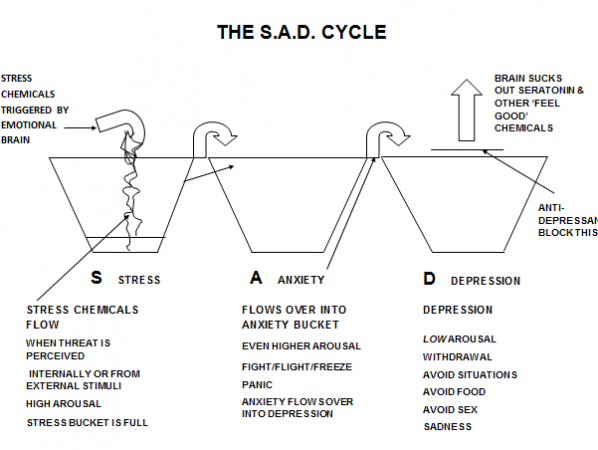What's the real cause of anxiety and depression?

If you search for 'causes of depression' chances are you won't come across stress, and yet stress is the cause of most kinds of depression (apart from, for example Bi-Polar Disorder and Seasonal Affective Disorder).
If stress is almost always the cause of anxiety and depression – why don't we hear that? More often it's that we have a 'chemical imbalance' in our brain. This of course can be corrected with Anti-Depressant drugs right? Well in some cases. But in many cases where these drugs are prescribed for anxiety and depression – they just don't work.
Anxiety and depression can be caused by a chemical imbalance. Bi-Polar Disorder (or Manic-Depression) is – but one of the most effective treatments for this is chemical Lithium, discovered by an Australian psychiatrist, John Cade.
SSRI's do work for some people and if they've worked for you that's great. But many studies have shown that Cognitive Behaviour Therapy that tries to address dysfunctional thoughts and behaviours works equally effectively. I'd list all the studies but they're too numerous.
So how does stress cause anxiety and depression?
If we have depression caused by dysfunctional thought – why do we have those thoughts? Why do we worry? Other animals don't worry – they just instinctively act.
We have our smart brain (we've evolved to have that) so why does it sometimes seem so dumb?
Worries and negative thoughts are usually caused by a reaction by the survival brain (the limbic system) - to stress. It wants us to think about threats to our survival and will insist that we do it over and over again. They turn into ruminations – those trains of thought that are actual neural pathways in our brain – fired and wired to lead us down the 'rabbit hole' of anxiety and depression. We worry about ourselves, our loved ones and sometimes even the planet.
Sometimes the trigger is internal (via a thought or a feeling) – sometimes external (we see something on the news).
'I'm fat', 'I'm no good', 'They hate me' are common negative thoughts but what do they have to do with survival?
They're about belonging and if we don't belong to the group, we might get marginalised to the edge of the group, get less food, less protection and have much more chance of being picked off by the tiger. So the survival brain will make us stress about doing things that are likely to result in our not belonging, or getting attention.
For example slim, attractive people get more attention (look in the average magazine). If we perceive we're lacking in some way ('I'm not good enough') we might not belong and be marginalised and these thoughts are very stressful.
Our stress bucket starts to fill up. Some have a very small bucket, others are more resilient and their bucket is large.
The stress bucket overflows into the anxiety bucket which then flows over into the depression bucket.
Here's my pictorial representation of the Stress Anxiety Depression (S.A.D.) cycle:
We need to bring stress back into the picture.
If it's true that it all starts with stress, then we need to lower the level in our stress bucket and the most effective way to do that is to change our thinking and take action. Drugs can help, but they're not the entire solution.
We live in a complex society full of stresses that our survival brain over-reacts to. It reacts to a grumpy boss like the tiger about to jump and that's enough to fill your stress bucket fast. The more each one of us is stressed – the more society is stressed - most likely contributing to our epidemic of S.A.D.
A fast way to reduce stress is to reduce our reactivity. When we feel we're reacting or getting stressed, take a big breath – count to three – and let it out slowly – before we do, think or say anything.
It's important to be mindful about when we're starting to feel stressed and take action. I wrote recently about the benefits of a daily mental hygiene workout.
Also don't be afraid to talk to friends, family and colleagues about stress; bring it back into the picture and help nip anxiety and depression in the bud.
If it all gets too much – remember to seek professional help or access these help lines:
Lifeline Australia - 13 11 14
Mensline Australia - 1300 78 99 78
Beyondblue - 1300 224 636
Suicideline Victoria - 1300 651 251
Suicide Call Back Service - 1300 659 467
Kids Helpline - 1800 551 800
